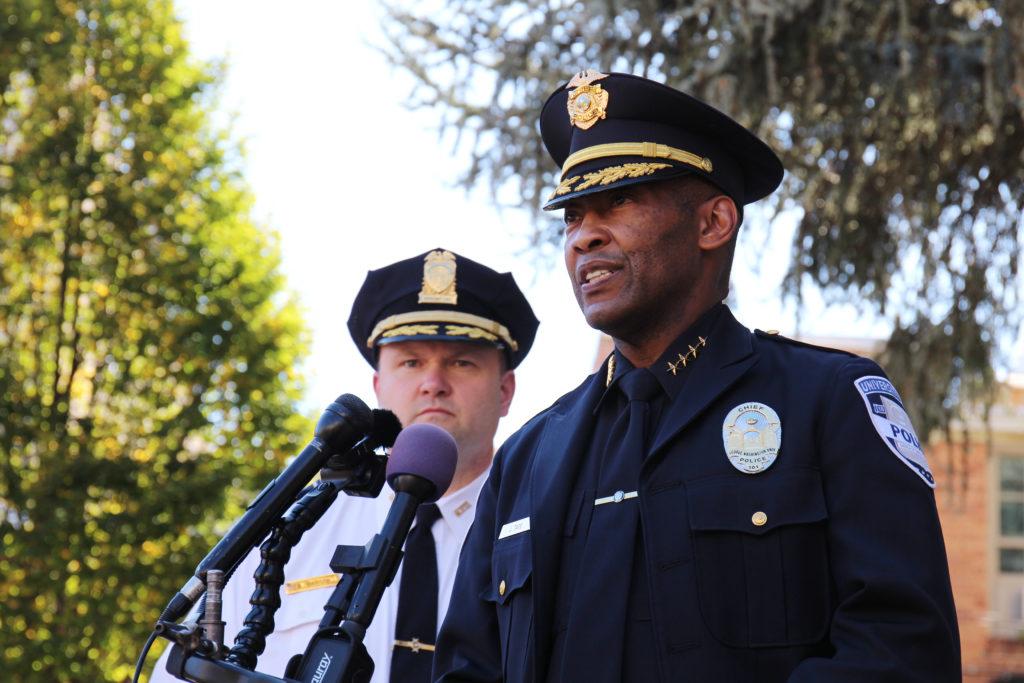Updated: April 7, 2022 at 3:48 p.m.
The number of people barred from campus has declined by more than half since 2017, data released by the GW Police Department shows.
The data reveals that GWPD officers issued 89 bar notices – which ban individuals from campus buildings for five years, subject to appeal before officials – in 2021. The report, which shows a 58 percent drop in barring notices since 2017, comes after student advocates for sexual assault survivors have called on the University to increase transparency and clarify the barring policy for students.
GWPD Chief James Tate said although officers can bar individuals from University buildings, these notices don’t apply to streets or public spaces on or near campus. Student leaders said in October that sexual assault survivors don’t feel safe on campus under the threat of their abusers returning to campus without punishment as a result of the University’s “unacceptable” handling of Title IX violations.
“We can only bar individuals from our property,” he said in an interview. “And so if we bar someone from District House, and they’re on the sidewalk in front of District House, they’re not violating the bar.”
Tate said most bar notices are distributed to people who trespass onto University property, though GWPD officers have also barred some subjects from campus for suspected harassment, theft and other crimes.
He said GWPD doesn’t have exclusive authority to ban students from campus. Title IX and Student Rights and Responsibilities can also limit a student’s access to from campus in accordance with their respective processes.
“Let’s say we arrest a student for assaulting another student, and they actually went to the detention facility, they got booked, all of those things happened, right?” Tate said. “We would not bar that student because that student needs to go through a University proceeding.”
GWPD barred about 13 people per month during the fall semester last year – after campus reopened to the entire student body – compared to about 18 per month throughout 2017, the highest rate of bar notices during the past five years. The number of bar notices dipped to 141 in 2018 and 138 in 2019, before plummeting to 57 in 2020 during the pandemic, the data shows.
Total crime on the Foggy Bottom Campus dropped by about 75 percent in 2020 during the pandemic, according to a GWPD report released last fall.
Tate said 41 people have appealed their barring notices since 2017, and 12 of those appeals were successful. He said other officials, like SRR officials, help determine if officials should grant appeals to students.
“Appeals may be granted where the basis for the barring notice no longer exists – for example, students whose permission to return to the University community was restored or their suspension period has ended,” he said.
Tate said GWPD gives about 10 percent of bar notices to students who are suspended or expelled, a lower number partly because there is a higher standard of investigation for students because of proceedings required to ban a student from campus. He said while officials can instantly ban non-GW affiliated subjects from campus, students undergo University proceedings within departments outside GWPD, like the Title IX Office and the Office of Student Rights and Responsibilities, before barring notices can be issued.
Tate said he hopes to release a map showing where barred people are legally allowed on campus to increase the public’s understanding of bar notices. He said he met with members of Students Against Sexual Assault last semester and determined the University’s barring procedures needed to be clarified because of confusion about what a barring notice entails.
“We’re working to bring some clarity to all of that and to share that in a pretty public way with our community so students, staff and faculty understand how the process works,” Tate said.
Members of gwprotectsrapists, a student advocacy group for sexual assault survivors, claimed GWPD has failed to communicate and meet with Students Against Sexual Assault about potential changes to the barring notices policy, according to a post the group released Wednesday.
“From pushing back meetings and dates for when we will be able to see any progress for months, it is clear to see that the University is just waiting for us to graduate and our movement to phase out,” the post states.
gwprotectsrapists deferred comment to SASA, whose members did not return multiple requests for comment.
Tate said GWPD’s response to bar violations depends on the circumstances of the violation, but if officers find someone has entered a building where they were previously barred, the subject will likely be arrested for trespassing.
He added that GWPD officers restrict barring notices to those who can cause disturbances or danger to the campus community. He said officers do not distribute bar notices to people sleeping in public areas on campus, despite University policy that grants GWPD the authority to do so.
“Our officers are trained to use some discretion in those sorts of situations,” Tate said. “If someone is not being disruptive, they’re simply out at two, three o’clock in the morning trying to rest where they can, I personally see no need to issue a bar.”
Henry Huvos contributed reporting.
This post has been updated to clarify the following:
This post has been updated to clarify roles of the Title IX Office and the Office Students Rights and Responsibilities in the barring process.








